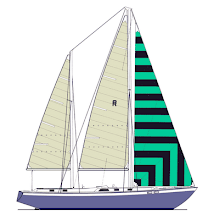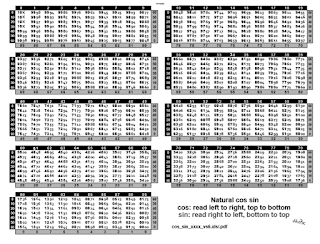Wednesday, November 11, 2020
Wallet Trig Log Scale for Navigation Calculations
A photo copy of a slide rule trig log scale will make for a very nice sextant box and wallet navigation calculator using a pair of chart dividers. The principle is the same as using a slide rule and good enough for most navigation calculations. Give a try for time,speed, distance, plotting sheet scaling, azimuth, amplitude, prime vertical. Even more advanced calculations of ex-meridian and circle of position radius can be done to sufficient precision.
Use this virtual slide rule link to select prefered slide rule to screen capture for printing.
https://www.sliderules.org/
Sunday, June 28, 2020
Solar Film Filter Mod on Davis MK 3 Sextant
The standard blue filter on a Davis MK 3 sextant can be replaced with cut to fit astronomy solar film for a very sharp sun image. Remove old filter by carefully pushing out the blue filter with thumbs and saving the plastic retainer to snap back in onto a piece of solar film that is cut to fit using the original filter as a template.
Link to astro solar film:
https://www.amazon.com/Thousand-Oaks-Optical-Telescopes-Binoculars/dp/B01770FDAC/ref=asc_df_B01770FDAC/?tag=hyprod-20&linkCode=df0&hvadid=343234125040&hvpos=&hvnetw=g&hvrand=5716050463909056819&hvpone=&hvptwo=&hvqmt=&hvdev=c&hvdvcmdl=&hvlocint=&hvlocphy=9011846&hvtargid=pla-442099537141&psc=1&tag=&ref=&adgrpid=68968886317&hvpone=&hvptwo=&hvadid=343234125040&hvpos=&hvnetw=g&hvrand=5716050463909056819&hvqmt=&hvdev=c&hvdvcmdl=&hvlocint=&hvlocphy=9011846&hvtargid=pla-442099537141
Link to astro solar film:
https://www.amazon.com/Thousand-Oaks-Optical-Telescopes-Binoculars/dp/B01770FDAC/ref=asc_df_B01770FDAC/?tag=hyprod-20&linkCode=df0&hvadid=343234125040&hvpos=&hvnetw=g&hvrand=5716050463909056819&hvpone=&hvptwo=&hvqmt=&hvdev=c&hvdvcmdl=&hvlocint=&hvlocphy=9011846&hvtargid=pla-442099537141&psc=1&tag=&ref=&adgrpid=68968886317&hvpone=&hvptwo=&hvadid=343234125040&hvpos=&hvnetw=g&hvrand=5716050463909056819&hvqmt=&hvdev=c&hvdvcmdl=&hvlocint=&hvlocphy=9011846&hvtargid=pla-442099537141
Tuesday, April 28, 2020
Floating 1st Surface Mirror Project for Davis Artificial Horizon
1. Cut 3/4" Styrofoam to 5 3/4' x 3 1/2"
2. Cut 3" x 3" rubber nonskid and center on top of styrofoam.
3. Pin 1/8" ball pins on all sides of each corner to fend float away from reservoir sides.
4. Place a 3" x 3" 1st surface laser bounce mirror mirrored side up and centered on rubber nonskid.
5. Install in reservoir filled with 10mm of water then cover with clear glass wind shield.
6. Set assembled artificial horizon onto an 8" Lazy Susan for easy 180 degree rotation.
https://www.ebay.com/itm/Plastic-Spinner-Lazy-Susan-Turntable-Organizer-Spice-Table-Cake-Pantry-Display/273939076319?hash=item3fc80a94df:m:mSgqai9PcGqJIxkOz0KBmDw
https://www.ebay.com/itm/First-Surface-Mirror-3-Square-3x3-aluminized-1-8-glass-FS-FSM-front/184261133642?hash=item2ae6d1c54a:g:s5AAAOSwN81WDBDR
A precise observation requires averaging a sight both ways across floated mirror. It is recommended to split the time difference and observed altitudes of the sight pair then perform a single sight reduction. Expect intercepts no worse than 1 minute of arc.
Friday, March 13, 2020
Longhand Ex-Meridian
An ex-meridian is a sight reduction method for determining latitude when the bodies local hour angle (t) is near the meridian. A tabular correction can be added to the observed Ho so as to enable a reduction as if observed exactly on the meridian (LHA zero). There are quite a few tables out there that perform this task but most are multiple pages with multiple look-ups. To expedite the ex-meridian reduction process it is possible to use a one page custom table for a longhand solution by formula:
+XM' = .5235 (t)(t)cos Lat cos Dec / cos Ho.
t = meridian angle degrees and tenths
Lat = assumed latitude
Dec = declination
Ho = observed altitude
Only two place precision is needed so a one page 10' natural cos sin trig table will work when combined with a custom factor (a) table.
Reworking the ex-meridian formula:
a = .5235 (t)(t)
+XM' corr. = a(cos Lat)(cos Dec) / cos Ho
The (a) value is extracted from a very compact custom table (see attached). Cosine values are extracted from a one page 10' trig table (see attached). Round to two places for quick longhand reduction (see attached example).
+XM' = .5235 (t)(t)cos Lat cos Dec / cos Ho.
t = meridian angle degrees and tenths
Lat = assumed latitude
Dec = declination
Ho = observed altitude
Only two place precision is needed so a one page 10' natural cos sin trig table will work when combined with a custom factor (a) table.
Reworking the ex-meridian formula:
a = .5235 (t)(t)
+XM' corr. = a(cos Lat)(cos Dec) / cos Ho
The (a) value is extracted from a very compact custom table (see attached). Cosine values are extracted from a one page 10' trig table (see attached). Round to two places for quick longhand reduction (see attached example).
Sunday, March 1, 2020
Recovering Time From Known Position
An accurate correction to the chronometer time piece can be made using the time sight formula from a known position or confident DR position. A Casio pocket trig calculator will do a great job of time sight calculating. The Martelli Tables can be used to recover time also for navigators preferring to go old school.
https://www.amazon.com/gp/offer-listing/B006BRJZG6/ref=tmm_pap_new_olp_sr?ie=UTF8&condition=new&qid=1583076778&sr=1-1
https://www.amazon.com/gp/offer-listing/B006BRJZG6/ref=tmm_pap_new_olp_sr?ie=UTF8&condition=new&qid=1583076778&sr=1-1
Subscribe to:
Comments (Atom)










